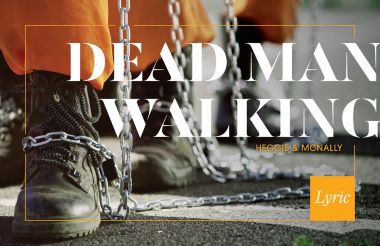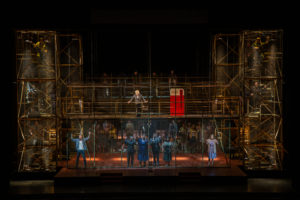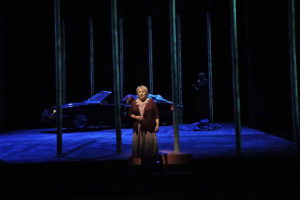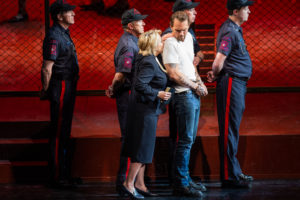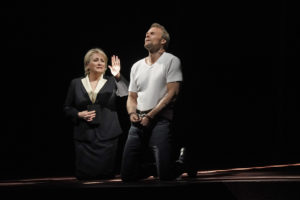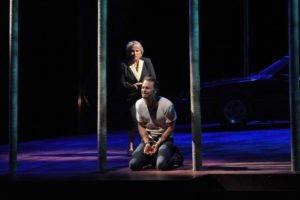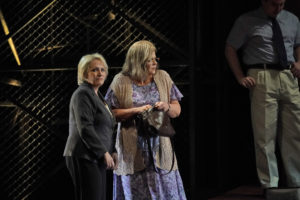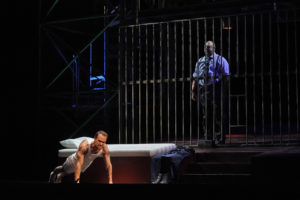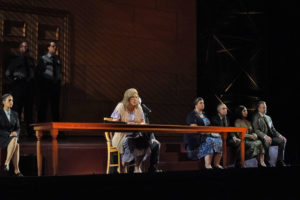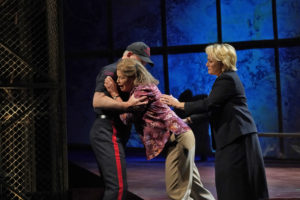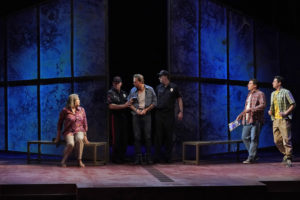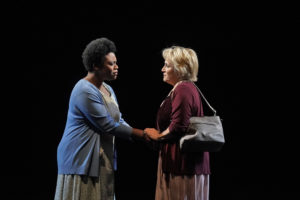DEAD MAN SINGING
Lyric Opera doesn’t put on many contemporary operas, at least not like the Windy City’s edgier companies Chicago Fringe Opera and Thompson Street Opera. And that’s not a criticism. But when Lyric Opera does go contemporary, it goes boldly, with big, splashy productions — and Dead Man Walking has got an excellent cast, good direction, and superbly realistic sets and costumes. The libretto and score aren’t terribly satisfying though.
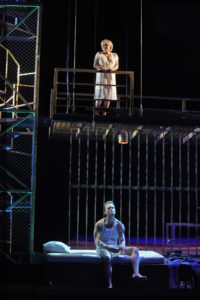 Jake Heggie’s first opera premiered at San Francisco Opera in 2000. Based on the book of the same name by Sister Helen Prejean, with a libretto written by Terrence McNally, the story follows Joseph De Rocher from the rape and murder that landed him in jail to his execution by the State of Louisiana. Along the way, De Rocher engages Sister Helen as his spiritual advisor.
Jake Heggie’s first opera premiered at San Francisco Opera in 2000. Based on the book of the same name by Sister Helen Prejean, with a libretto written by Terrence McNally, the story follows Joseph De Rocher from the rape and murder that landed him in jail to his execution by the State of Louisiana. Along the way, De Rocher engages Sister Helen as his spiritual advisor.
Dead Man Walking explores redemption, confession, and forgiveness, but strangely shies away from social justice and the ethics of capital punishment. As a result, the plot feels strangely unmoored, even hollow. We never really understand how and why this connection between nun and prisoner developed; it just is. Fortunately, McNally infuses the libretto with enough humor to keep it from getting too heavy.
The score is about one-third to one-half melodic and tonal, which makes it more delightful to listen to than, say Alban Berg or Heggie’s contemporary Ricky Ian Gordon. It suffers from a tendency that afflicts many first-time opera composers: overstatement. As with Jimmy Lopez’s Bel Canto, which premiered at Lyric Opera in 2015, Dead Man Walking is simply too loud, its climactic moments culminating in cacophony. The most memorable and melodic music of the score, however, is the bouncy spiritual “He will gather us around, all around,” which is unlike almost everything else in the score and serves as its unifying theme. Otherwise, much of Heggie’s vocal writing comes across as either dull and colorless or atonal and unnatural.
Director Leonard Foglia opts for maximum realism in this production, which is helped along by Michael McGarty’s sets and Jess Goldstein’s costumes. It begins with a real car on set, headlights on, radio playing. Then De Rocher’s victims run onstage completely naked, and then proceed to make out on a blanket. The De Rocher brothers appear and kill the man, before raping and killing the woman also. I can understand not wanting to minimize the sheer horror of the crime, but the nudity seems a bit gratuitous. Later, when Sister Helen is driving to the prison, she’s stopped by a cop in full uniform on a real motorcycle. Moreover, the production is assisted by a dialect coach.
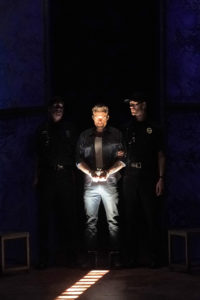 Soprano Patricia Racette, who stars as Sister Helen, hasn’t been seen at Lyric since 2013/14, but was seen more recently at Chicago Opera Theater in Poulenc’s La Voix Humaine. Racette gives a strong, restrained performance, one that highlights the humility and simplicity of her character. Bass-baritone Ryan McKinny makes his Lyric debut as the condemned prisoner. His performance is visceral and raw, portraying his character’s anguish with just the right mixture of anger and penitence.
Soprano Patricia Racette, who stars as Sister Helen, hasn’t been seen at Lyric since 2013/14, but was seen more recently at Chicago Opera Theater in Poulenc’s La Voix Humaine. Racette gives a strong, restrained performance, one that highlights the humility and simplicity of her character. Bass-baritone Ryan McKinny makes his Lyric debut as the condemned prisoner. His performance is visceral and raw, portraying his character’s anguish with just the right mixture of anger and penitence.
Among a large cast of minor characters, Susan Graham, who debuted the role of Sister Helen at the opera’s premiere in 2000, is noteworthy as Mrs De Rocher. Also worthy of mention is tenor Clay Hilley’s Lyric debut as Father Greenville. Other bit parts are filled by promising members of the Ryan Opera Center, while the Chicago Children’s Choir opens and closes the production with their happy renditions of “He will gather us around…”
There’s no doubt that this is a thoroughly American opera, and a very contemporary one. Although the debate on capital punishment has moved forward considerably since this opera’s premiere, the conversation on prisons remains timely. But Dead Man Walking isn’t a political piece; it’s a very human story of love and redemption. Heggie’s opera runs a bit long (roughly three hours) and loud, but Lyric’s production does it full justice.
photos by Ken Howard
Dead Man Walking
Lyric Opera of Chicago
Civic Opera House, 20 N. Wacker Drive
ends on November 22, 2019
for tickets, call 312.827.5600 or visit Lyric Opera
for more shows, visit Theatre in Chicago
